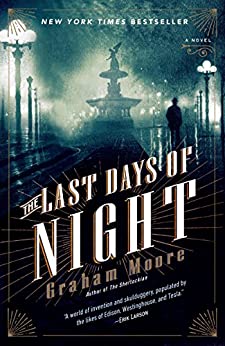More on this book
Community
Kindle Notes & Highlights
It was the “you” that stung the most. This disaster was of Paul’s making. “I made a mistake.” “You made a mistake,” repeated Hughes. “But you won’t again. That’s all we ask.” Paul looked to Hughes for a rope of any kind with which to pull himself up. “What do you want?” asked Paul. But as soon as he said it, he realized what was coming. And he
role would be to cool tempers. Surely whatever unpleasantness
Edison filed a vague patent that covered far too wide an area. Only, what if Edison hadn’t actually gotten the thing working at all?
What evidence was there that Edison actually invented a working bulb?” “There must have been demonstrations.” “Brief ones. A minute at a time…two…That’s how they’re described in all of the articles. A journalist, or an investor, would be led in to see the bulb for a minute. Two at the most, and then ushered straight out. Supposedly this was so that no one could view Edison’s design long enough to steal it. But what if the demonstrations were
so brief for a different reason?” “That reason being that the bulbs
really ...
This highlight has been truncated due to consecutive passage length restrictions.
Could Paul show that Edison had contradicted himself somewhere? Could Paul find a statement from one of Edison’s engineers that contradicted his boss?
Edison was the figurehead of a large organization, just as any industrial-age baron was. Andrew Carnegie ruled an organization that refined more pig iron than any other in the world. Jay Gould produced railroads and John Rockefeller drew oil from the depths of the earth. The genius of each of these men was not in the labors of his own hands, it was in the efficiency of the system he had built.
Thomas Edison was not, Paul thought, the first man to become rich by inventing something clever. Rather, he was the first man to build a factory for harnessing cleverness. Eli Whitney and Alexander Graham Bell had each made his name by inventing one brilliant thing. Edison had formed a laboratory that had invented many. His genius was not in inventing; rather, it was in inventing a system of invention.
The United States was of an anti-intellectual bent. And
with
Money was a far more predictable motivator than legacy, or fame, or love, or whatever else might rouse a man from his bedsheets. An artist—or an inventor—was a far more dangerous partner than a businessman. The latter’s betrayals could be planned for, even depended upon.
Paul was clever. Tesla, Edison, and Westinghouse were geniuses. What was Morgan? Paul felt himself in the presence of something else entirely.
“What Morgan wants above all else,” continued Paul, “is returns. No more feuds, no more personal vendettas. When you’re in charge, you’ll make the deal with Westinghouse
because you know it makes financial sense. It’s
“Let’s make it simple. Just lop off the first word. The one I dislike.” “All right.” “ ‘General Electric.’ It has a rather nice ring to it, doesn’t it?”
Tesla was happiest when he was working. Westinghouse was happiest when he’d finished. Edison would be happiest only when he’d won.
“If Edison wins, the entire national electrical network will be built on direct current. If you allow Westinghouse to go under, you will doom America to D/C. To Edison. To a century of technological backwardness.”
However, the bulk of the events depicted in this book did happen and every major character did exist. Much of the dialogue comes either from the historical personages’ own mouths or from the tips of their prodigious pens. Yet many of these events have been reordered and characters appear in places they may not have. I’ve frequently invented situations that very well could have happened but were certainly not documented. This book is a Gordian knot of verifiable truth, educated supposition, dramatic rendering, and total guesswork. What I’d like to do in this note is to help untangle it for you.
All personal and biographical description of Nikola Tesla contained here is accurate. Margaret Cheney’s Tesla: Man Out of Time was


